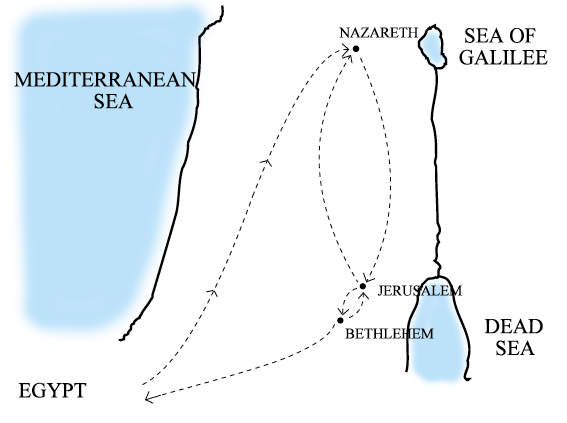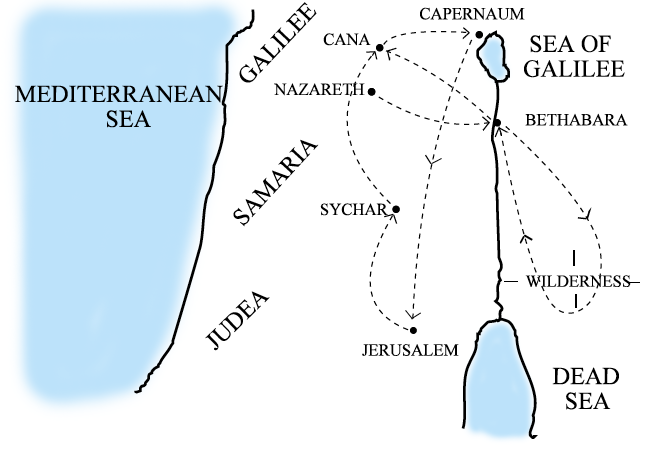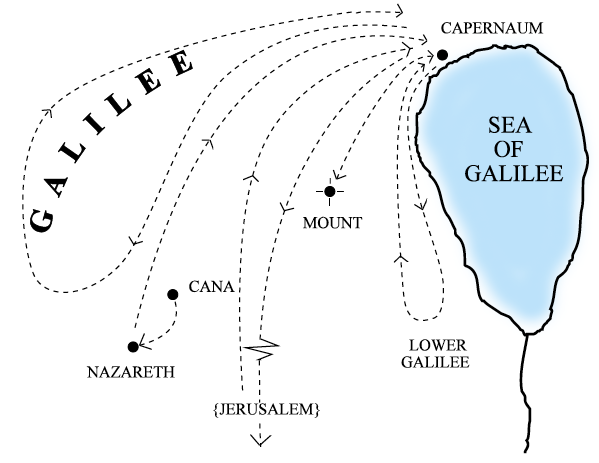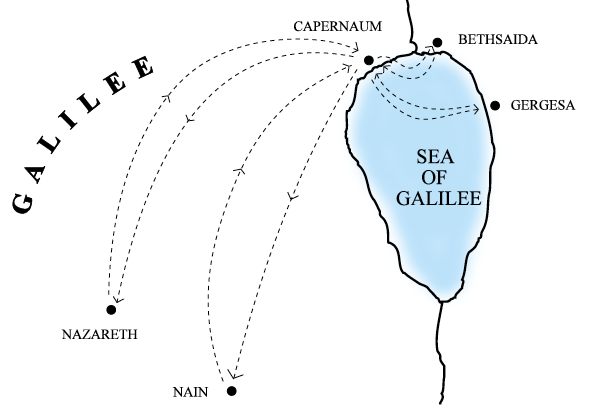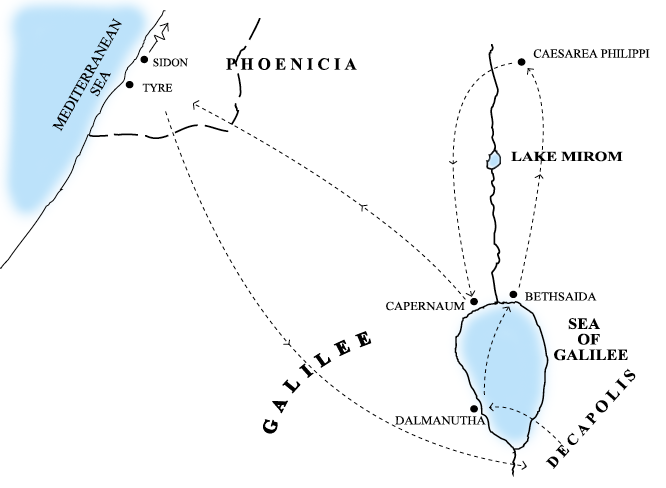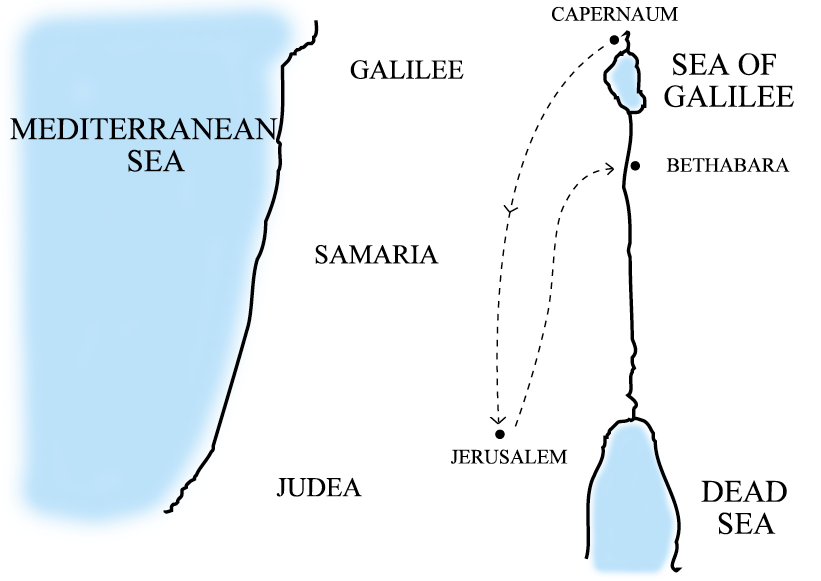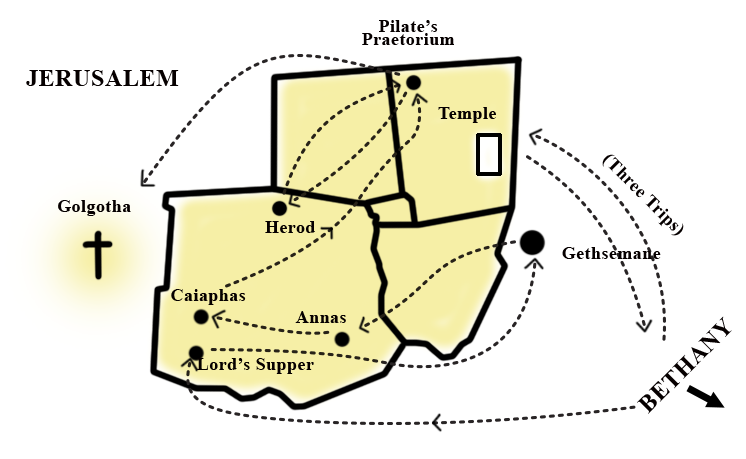Subscribe to this page via e-mail here - Subscribe
Article 35 - The Life of Christ
This is the longest period in the life of Jesus, spanning 30 years. However, it contains the fewest recorded events.
I. His Birth (Bethlehem)
This period covers approximately 15 months, from Jesus' baptism to his healing of the nobleman's son in Cana, and is made up of 5 journeys.
I. Baptism (from Nazareth to Bethabara)
Period Of Early Galilean Ministry
This period covers about 4 months, from Jesus' rejection at Nazareth to the events following his sermon on the mount, and is made up of 5 journeys.
I. Opening Of Jesus' Ministry (from Cana to Nazareth to Capernaum)
Period Of Later Galilean Ministry
This period covers probably ten months, from the healing of the centurion's servant to Jesus' discourse on the "bread of life," and is made up of four journeys.
I. Tour In Southern Galilee (from Capernaum to Nain and return)
return)
Period Of Outreach
This period covers about six months, from Jesus' discourse on the "bread of life" to his discourse on humility, and is made up of four journeys.
I. Journey To Phoenicia (from Capernaum to the borders of Tyre and Sidon)
Period Of Judean Ministry (Confrontation)
This period covers approximately three months, from Jesus' great lessons at Capernaum to his arrival in Bethabara and is made up of two journeys.
I. Journey to Jerusalem (from Capernaum to Jerusalem)
Closing His Earthly Ministry
This period covers five months, from Bethabara to Bethany.
I. Journey To Judea (from Bethabara to Judea)
III. Journey To Ephraim (from Bethany to Ephraim)
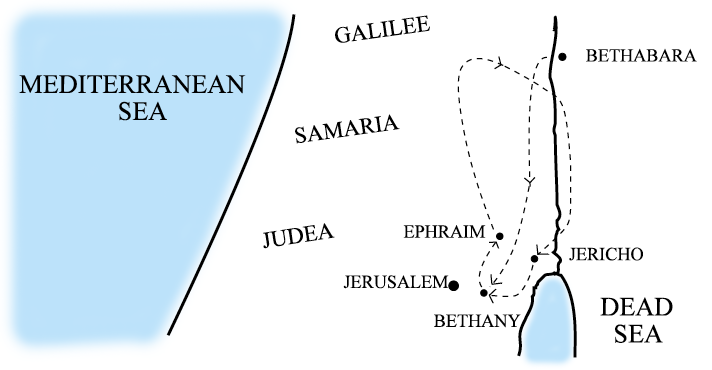
Period Of Passion
This period covers only one week, from Jesus' anointing by Mary at Bethany to his crucifixion at
Jerusalem, and is divided into eight parts.
I. Jesus Arrived At Jerusalem (from Bethany to Jerusalem)
IV. Jesus Is Taken Before Annas, Father-In-Law Of The High Priest (Jn. 18:13, 19-23)
V. Jesus Is Taken Before Caiaphas The High Priest (Jn. 18:24; Matt. 26:57-68)
VI. Jesus Is Delivered To Pilate The chief priests and elders sent Jesus to the governor. (Lk. 23:1-50)
VII. Jesus Is Sent To Herod And Back To Pilate (from Pilate to Herod and return)
Print
The Life of Christ: Historically and Geographically
Jon Gary Williams
Jon Gary Williams
Period Of Preparation
This is the longest period in the life of Jesus, spanning 30 years. However, it contains the fewest recorded events.
I. His Birth (Bethlehem)
A. Mary and Joseph informed of Jesus' coming miraculous birth (Lk. 1:26-31; Matt. 1:18-23)II. Presentation At The Temple (from Bethlehem to Jerusalem and return)
B. At Bethlehem - (see Mic. 5:2) (Lk. 2:4-7; Lk. 2:15-18)
A. At 40 days Jesus was taken to be presented at the temple in Jerusalem. (Lk. 2:22-24)III. Visit Of The Wise Men And Flight Into Egypt (from Bethlehem to Egypt)
B. Here Jesus was identified by Simeon and Anna. (Lk. 2:25-32; 36-38)
A. Wise men from the east came to worship Jesus. (Matt. 2:1-12)IV. Settlement In Nazareth (from Egypt to Nazareth)
B. After the visit of the wise men, Jesus was taken to Egypt to escape Herod. (Matt. 2:13-15)
C. Herod set forth to kill all children up to two years. (Matt. 2:16,17)
A. After Herod's death Jesus was taken to Nazareth where he spent his childhood. (Matt. 2:19-23)V. Visit To The Temple (from Nazareth to Jerusalem and return)
B. The next 9-10 years pass in silence.
A. At age twelve, this is the only recorded event of Jesus' boyhood.
B. Having discovered he was missing, Joseph and Mary found him in the temple discussing with the doctors of the law. (Lk. 2:40-50)
C. He and his family returned to Nazareth. (Lk. 2:51,52)
D. The next 18 years pass in silence.
Period Of Inauguration
This period covers approximately 15 months, from Jesus' baptism to his healing of the nobleman's son in Cana, and is made up of 5 journeys.
I. Baptism (from Nazareth to Bethabara)
A. During the preaching of John the Baptist, Jesus left Nazareth and went to see him at Bethabara, 13 miles south of the Sea of Galilee. (Jn. 1:6-8; Mk. 1:9; Jn. 1:28)II. Temptation (from Bethabara to the wilderness and return)
B. At age 30 he was baptized and received the testimony of his Sonship. (Jn. 1:29-31) (Matt. 3:13-17; Lk. 3:23)
A. After his baptism Jesus was led by the Spirit into the wilderness where he fasted and overcame Satan's temptations. (Matt. 4:1-11)III. Marriage Feast At Cana (from Bethabara to Cana and Capernaum)
B. Returning to Bethabara he received the testimony of John and finds his first apostles. (Jn. 1:29-34; 35-51)
A. At a wedding in Cana Jesus performed his first miracle. (Jn. 2:1-11)IV. First Passover (from Capernaum to Jerusalem)
B. He then went to Capernaum with his mother, brothers and disciples. (Jn. 2:12)
A. At the first passover during his ministry Jesus asserted his authority by cleansing the temple. (Jn. 2:13-17)V. Return To Galilee (from Jerusalem to Sychar and Cana)
B. Later, Nicodemus, a ruler of the Jews, came to him during the night. (Jn. 3:1-6)
A. After John's imprisonment Jesus left Judea and traveled to Galilee. Passing through Samaria, at Sychar he met a woman at Jacob's well. (Jn. 4:1-15)
B. He then went to Cana where he healed a nobleman's son. (Jn. 4:43-54)
Period Of Early Galilean Ministry
This period covers about 4 months, from Jesus' rejection at Nazareth to the events following his sermon on the mount, and is made up of 5 journeys.
I. Opening Of Jesus' Ministry (from Cana to Nazareth to Capernaum)
A. Jesus went to Nazareth where he was rejected and escaped being put to death. (Lk. 4:16-30)II. Preaching In The Cities Of Galilee (from Capernaum to parts of Galilee)
B. At Capernaum he healed many and cast out many demons. (Lk. 4:31-44)
A. He visited various cities preaching and healing many. (Matt. 4:23-25) (cf. Lk. 4:44)III. His Work In The Region Of Capernaum (Capernaum and other parts of Galilee)
B. At the Sea of Galilee after the miracle of fishes he called two more apostles. (Lk. 5:1-11)
A. In an unnamed city Jesus healed a leper. As many more were healed his fame continued to spread. He withdrew to the wilderness to pray. (Lk. 5:12-16)IV. Second Passover (from Capernaum to Jerusalem and return)
B. In Capernaum (Mk. 2:1) he healed a paralytic let down through a roof. (Lk. 5:17-26)
C. Levi (Matthew, Matt. 9:9) was called to be an apostle. (Lk. 5:27,28)
A. Jesus went to Jerusalem for the second passover during his ministry. While there he healed a cripple on the sabbath. When the Jews became angry and sought to kill him, he defended his actions. (Jn. 5:1-47)V. Sermon On The Mount (from Capernaum to a mount and return)
B. On returning to Capernaum he defended his disciples who had plucked grain on the sabbath and asserted his authority as "Lord of the sabbath." (Lk. 6:1-5)
C. Later, in the synagogue on a sabbath he healed a man's withered hand. Again he was accused and again he justified himself. (Lk. 6:6-11)
A. Jesus went to a mount and prayed all night, after which he appointed the apostles. (Lk. 6:12-16)
B. Here Jesus preached the "sermon on the mount." (Lk. 6:17-49) (cf. Matt. 5-7)
C. He returned to Capernaum where he healed a centurion's servant. (Lk. 7:1-10)
Period Of Later Galilean Ministry
This period covers probably ten months, from the healing of the centurion's servant to Jesus' discourse on the "bread of life," and is made up of four journeys.
I. Tour In Southern Galilee (from Capernaum to Nain and return)
A. Jesus went to Nain and healed a widow's son. (Lk. 7:11-17)II. Gadarene Voyage (from Capernaum to the country of the Gadarenes [probably Gergesa] and
B. Here Jesus answered John's questions. (Lk. 7:18-35) Later his feet were washed by a "sinful woman." (Lk. 7:36-50)
C. On his return to Capernaum he visited many villages. (Lk. 8:1-3)
return)
A. Jesus was accused of healing by the power Satan. (Mk. 3:22-30)III. Tour In Central Galilee (from Capernaum to Nazareth and return)
B. By the sea side he taught many parables. (Matt. 13:1-53)
C. While sailing to the country of the Gadarenes (Mk.5:1) he stilled the tempest. (Mk. 4:35-41)
D. In the country of the Gadarenes he healed the man possessed of multiple demons. (Mk. 5:1-13)
E. After returning to Capernaum a woman with an issue of blood was unexpectedly healed as well as the young daughter of Jairus. (Mk. 5:21-42)
A. Jesus was again rejected at Nazareth. He then traveled to other villages in Galilee. (Mk. 6:1-6)IV. Retirement To Bethsaida (from Capernaum to Bethsaida and return)
B. The twelve were sent on the "limited" commission. (Mk. 6:7-13)
C. Later, Jesus heard the report of the twelve. Mk.6:30 Details of the death of John the Baptist are mentioned. (Mk. 6:17-28)
A. Jesus sailed to Bethsaida (Lk. 9:10) where, when the people found him, he was compelled to
teach. Here he fed the five thousand. (Mk. 6:31-44)
B. Jesus appeared to the apostles walking on the water. (Mk. 6:45-51) (cf. Matt. 14:22-33)
C. They landed at "Gennesaret" (Capernaum) where Jesus again healed many. (Mk. 6:53-56)
D. The multitudes followed Jesus to Capernaum. Finding him in the synagogue (Jn.6:59) Jesus
taught the great lesson on the "bread of life." (Jn. 6:24-58)
Period Of Outreach
This period covers about six months, from Jesus' discourse on the "bread of life" to his discourse on humility, and is made up of four journeys.
I. Journey To Phoenicia (from Capernaum to the borders of Tyre and Sidon)
A. While in Capernaum Jesus made another defense of his disciples. (Mk. 7:1-23)II. Journey To Decapolis (from the borders of Tyre and Sidon to Decapolis)
B. In the region of Tyre and Sidon Jesus cast a demon out of the daughter of a Syrophenician woman. (Mk. 7:24-30)
A. Jesus journeyed through Galilee and arrived at Decapolis. (Mk. 7:31)III. Journey To Caesarea Philippi (from Decapolis to Dalmanutha, to Bethsaida and to the region of Caesarea Philippi)
B. Here Jesus wrought two miracles:
1. The healing of a man who was deaf and had an impediment of speech. (Mk. 7:32-37)
2. The feeding of the 4000. (Mk. 8:1-9)
A. Jesus sailed across the Sea of Galilee to the region of Dalmanutha and was met by Pharisees seeking a sign. (Mk. 8:10-13)IV. Jesus' Last Return to Capernaum (from the region of Caesarea Philippi to Capernaum)
B. He then sailed north to Bethsaida where he healed a blind man. (Mk. 8:22-26)
C. Later, in the area of Caesarea Philippi, Jesus told his disciples about the coming of his church. (Matt. 16:13-20)
D. Here, Jesus began to tell his disciples of his coming death and resurrection and what it meant to be his followers. (Matt. 16:21-27)
E. A few days later Jesus was transfigured with Moses and Elijah before Peter, James and John. (Mk. 9:2-10) (cf. Matt.17:1-9)
F. Following this, Jesus cast out a demon of the worse kind - one his disciples could not cast out. (Mk. 9:17-29)
A. Jesus traveled south and came again to Capernaum. (Mk. 9:33a)
B. Here Jesus taught lessons on different topics. (Matt. 18:1-35)
Period Of Judean Ministry (Confrontation)
This period covers approximately three months, from Jesus' great lessons at Capernaum to his arrival in Bethabara and is made up of two journeys.
I. Journey to Jerusalem (from Capernaum to Jerusalem)
A. In a city of Samaria where Jesus was rejected, he rebuked James and John for wanting to call down fire from heaven. (Lk. 9:51-56)II. From Jerusalem Jesus went to Bethabara (from Jerusalem to Bethabara)
B. Jesus talked with three who thought they wanted to follow him. (Lk. 9:57-62)
C. When Jesus arrived at Jerusalem he taught in the temple. (Jn. 7:10-36)
1. A division arose concerning him. (Jn. 7:37-53)D. Near Jerusalem (Bethany) Jesus visited the home of Martha and Mary and taught a lesson on priorities. (Lk. 10:38-42)
2. A woman caught in adultery was brought to him. (Jn. 8:2-11)
3. He asserted his eternal existence which angered many. (Jn. 8:51-59)
4. He healed another blind man. (Jn. 9:1-12) This led to an extensive investigation on the part of the Pharisees. (Jn. 9:13-34)
5. He spoke of himself as the "door" and "shepherd" and another division arose. (Jn. 10:1-21)
E. Jesus taught his disciples about prayer (Lk. 11:1-13); was again accused of working by the power of Satan (Lk. 11:14-26); denounced the Pharisees and lawyers (Lk. 11:37-54); taught about hypocrisy, covetousness, worldly anxieties and stewardship (Lk.12:1-59); emphasized the need for repentance (Lk. 13:1-9); and defended healing on the sabbath day. (Lk. 13:10-17).
F. Jesus was again confronted by the Jews. (Jn. 10:22-39)
A. Due to being rejected Jesus left Jerusalem for Bethabara. (Jn. 10:39,40) (see Jn.1:28)
B. Here he made preparations for the closing of his earthly ministry.
Closing His Earthly Ministry
This period covers five months, from Bethabara to Bethany.
I. Journey To Judea (from Bethabara to Judea)
A. Jesus traveled through cities and villages preaching. (Lk. 13:22)II. Arrival At Bethany (Jesus went to Bethany where he raised Lazarus.) (Jn. 11:1-46)
B. He was warned about Herod Antipas. (Lk. 13:31-33)
C. On a sabbath while at the home of a chief Pharisee, Jesus challenged Jewish traditions by healing a man suffering from dropsy. (Lk. 14:1-6)
D. Multitudes followed him and he taught on the cost of discipleship. (Lk. 14:25-27)
E. When murmured against for receiving sinners, in response Jesus taught three parables: the lost sheep, the lost coin and the lost son. (Lk. 15:1-32)
F. Jesus taught in parables on wisdom and covetousness and related the story of the rich man and Lazarus. (Lk. 16:1-31)
III. Journey To Ephraim (from Bethany to Ephraim)
A. Fearing the influence of Jesus, the Jews sought to kill him. (Jn. 11:47-53)IV. Last Journey Through Samaria And Galilee (from Ephraim through Samaria and Galilee)
B. Jesus went to Ephraim to spend time with some disciples. Jn.11:54 The Jews wondered if he would come to Jerusalem during the Passover. (Jn. 11:55,56)
C. The chief priests and Pharisees commanded the people to report Jesus' whereabouts. (Jn. 11:57)
A. Jesus healed the ten lepers and spoke of the events of his second coming. (Lk. 17:11-37)V. Journey to Jericho (from Galilee to Jericho)
B . While traveling east of Jordan, Jesus taught on divorce and remarriage. (Matt. 19:1-9)
C. He responded to a question asked by a rich young ruler. (Matt. 19:16-22)
D. Jesus again spoke of his coming death and resurrection. (Matt. 20:17-19)
E. He rebuked the selfish ambitions of James and John. (Matt. 20:20-28)
A. Entering Jericho Jesus healed a blind beggar. (Lk. 18:35-43)VI. Journey To Bethany (from Jericho to Bethany) (Jn. 12:1)
B. In Jericho he went to the home a chief publican named Zacchaeus. (Lk. 19:1-10)

Period Of Passion
This period covers only one week, from Jesus' anointing by Mary at Bethany to his crucifixion at
Jerusalem, and is divided into eight parts.
I. Jesus Arrived At Jerusalem (from Bethany to Jerusalem)
A. Jesus made his triumphal entry into Jerusalem. (Mk. 11:1-11)II. The Last Supper (from Bethany to Jerusalem)
B. For the second time he cleansed the temple. (Mk. 11:12-19)
C. The next day he taught in Jerusalem and was questioned by the chief priests and elders. (Mk. 11:27-33) He was also confronted by the Pharisees and Sadducees. (Mk. 12:13-27)
D. Later, on the Mt. of Olives, Jesus foretold of the fall of Jerusalem. (Matt. 24:1-34)
A. The betrayal foretold. (Matt. 26:17-25) (cf. Jn.13:18-30)III. Jesus Went To Gethsemane Here he endured agony and was later arrested. (Matt. 26:36-56)
B. Here, Jesus instituted the Lord's supper. (Matt. 26:26-30)
IV. Jesus Is Taken Before Annas, Father-In-Law Of The High Priest (Jn. 18:13, 19-23)
V. Jesus Is Taken Before Caiaphas The High Priest (Jn. 18:24; Matt. 26:57-68)
VI. Jesus Is Delivered To Pilate The chief priests and elders sent Jesus to the governor. (Lk. 23:1-50)
VII. Jesus Is Sent To Herod And Back To Pilate (from Pilate to Herod and return)
A. Pilate learned of Herod's jurisdiction over Jesus. After seeing Jesus, Herod sent him back to Pilate. (Lk. 23:6-11)
B. Pilate reluctantly sentences Jesus. (Lk. 23:13-24)
C. Jesus was mocked and humiliated by Roman soldiers. (Matt. 27:27-31)
VIII. The Crucifixion (from Pilate to Golgotha)
A. For a time Jesus bore the cross. (Jn. 19:17) However, eventually Simon was compelled to bear it for him. (Matt. 27:32)
B. Jesus was crucified. (Lk. 23:33-46)
| Powered By |
| TheLordsWay.com |
| Click here to host your own church web site today! |


